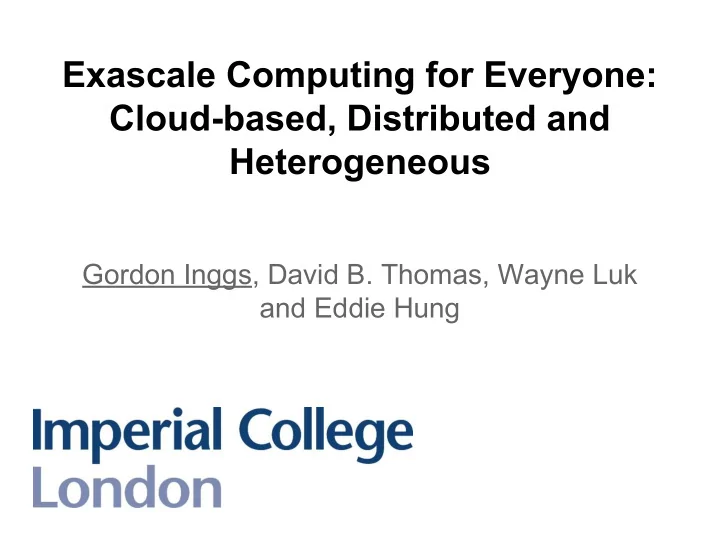

Exascale Computing for Everyone: Cloud-based, Distributed and Heterogeneous Gordon Inggs, David B. Thomas, Wayne Luk and Eddie Hung
● HPC trends ● 3 Challenges ● Our approach ● Evaluation
Trend 1: Increasing Heterogeneity
EOL for Von Neumann Frequency Scaling
Rise of Alternatives Multicore CPU and GPU Performance Growth Source: NVIDIA
Rise of Alternatives FPGA Market Evolution
Trend 2: Infrastructure-as-a-Service
Providers Type Theoretical Rate Peak ( $/hour ) Performance ( TFLOPS ) Google MCPU ~1.6 1.280 Compute Engine Microsoft MCPU ~1.2 9.65 Azure Amazon MCPU 1.8 1.856 Compute Engine Amazon GPU 9.16 2.6 Compute Engine IaaS Performance/Cost Breakdown
Where does all the money go?
3 Challenges How do I: 1. Execute my tasks on distributed, heterogeneous platforms? 2. Predict the runtime characteristics of my executions? 3. Use my resources efficiently?
The Possibility: Superlinear Performance
The Possibility: Superlinear Performance
The Possibility: Superlinear Performance
Our Approach
Application Domain ● Natural grouping of computational operations and types ● Manifest as Domain Specific Languages and Application Libraries ● Result from empirical software engineering show that typically 10-15 high level operations usually dominate utilisation
3 Solutions 1. Portable Performance : Exploit domain power law distributions 2. Metric Modelling : Use domain knowledge to identify and populate models in advance 3. Efficient Partitioning: Use metric models and formal optimisation to balance user objectives
Evaluation
Our Domain: Forward Looking Option Pricing ● Finding the value of a derivative contract ● Two Types: Underlyings and Derivatives ● One Operation: Pricing
Monte Carlo Option Pricing
Monte Carlo Pricing as Map Reduce
Our Application Framework: Forward Financial Framework (F 3 ) ● Python-based Application Framework ● Backends - open standards & platform tools: ○ POSIX + GCC ○ OpenCL + Vendor tools ○ OpenSPL + Maxeler
Experimental Tasks ● Portfolio Evaluation: ○ 35 x Black-Scholes Barrier and Asian Options ○ 93 x Heston Model European, Barrier and Asian Option ● Scale: ○ 35 MFLOP per simulation of all options ○ 10M - 100M simulations required ○ PetaFLOP scale computation
Experimental Platforms - CPUs ● Tool: GCC 4.8 using POSIX threads ● Local: ○ Desktop - Intel Core i7-2600 (7 threads) ○ Local Server - AMD Opteron 6272 (64 threads) ○ Local Pi - ARM 11 (1 thread) ● Remote: ○ Remote Server - Intel Xeon E5-2680 (32 threads) ○ AWS EC1 & WC1 - Intel Xeon E5-2680 (16 threads) ○ AWS EC2 & WC2 - Intel Xeon E5-2670 (7 threads)
Experimental Platforms - GPUs ● Tool: NVIDIA, Intel and AMD SDKs for OpenCL ● Local: ○ Local GPU 1 - AMD Firepro W5000 ○ Local GPU 2 - NVIDIA Quadro K4000 ● Remote: ○ Remote Phi - Intel Xeon Phi 3120P ○ AWS GPU EC and GPU WC - NVIDIA Grid GK104
Experimental Platforms - FPGAs ● Tool: Maxeler Maxcompiler and Altera OpenCL SDK ● Local: ○ Local FPGA 1 - Xilinx Virtex 6 475T ○ Local FPGA 2 - Altera Stratix V D5
Portable Performance
Portable Performance
Metric Modeling ● Domain Metrics: ○ Makespan (in seconds) ○ Accuracy (size of 95% confidence interval) ● Latency Model: ● Accuracy Model:
Metric Modeling
Metric Modeling
Metric Modeling
Efficient Partitioning ● Achieve superlinear performance scaling ● Vary allocation to explore design space ● Three approaches: ○ Heuristic ○ Machine Learning-based ○ Formal Mixed Integer Linear Programming
Efficient Partitioning Metric that we care about
Efficient Partitioning
Efficient Partitioning
Efficient Partitioning
● HPC trends and Challenges ● Our domain specific approach: ○ Explicit Parallelism ○ Metric Models ○ Formal Optimisation ● Evaluation
Thanks!
Metric Modeling
Efficient Partitioning
Recommend
More recommend